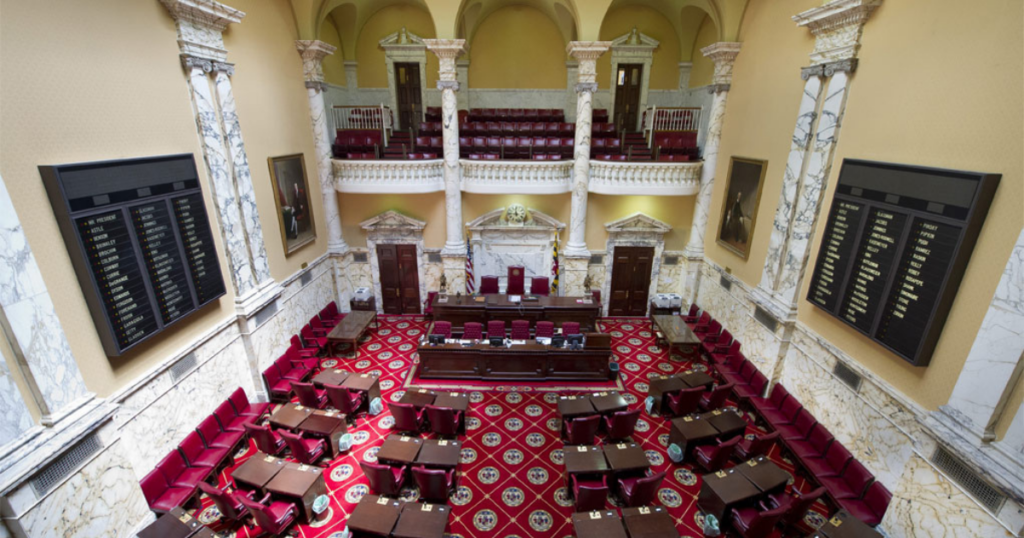This article first appeared here, at Heraldmailmedia.com
The Senate’s first bill introduced in the 2023 Maryland General Assembly went until the last day in both chambers in Annapolis as legislators questioned both the final push and constitutionality of the gun proposal on which they were to vote.
“I’m not speaking on this bill, I’m speaking on this process,” said Del. Kevin Hornberger, R-Cecil, on SB1, gun legislation to alter the state’s laws after the Supreme Court struck down a New York law last summer, “and this process is flawed.”
Del. Caylin Young, D-Baltimore City, who voted for the bill, said in a fiery floor speech he expected the legislation to be challenged in court. Similar concerns were expressed later by Senate Republicans on the floor about the constitutionality of the legislation that eventually passed both chambers. The legislation now heads to Democratic Gov. Wes Moore for final approval.
A different kind of session all around in Annapolis
For the last 52 years, the Maryland General Assembly has convened starting on the second Wednesday in January, typically for a 90-day session. In that regard, this year was no different.
However, there was plenty that was different this year in Annapolis. A new governor, attorney general, comptroller and a fresh cadre of legislators all were sworn in the first month of 2023.
“Despite a time of major transition at all levels of government,” said Senate President Bill Ferguson, D-Baltimore City, during an April 7 press conference, “we’ve set ourselves up in this first year of a term for success for the next four years.”
From the first week that the new governor took office, just days after the General Assembly was sworn in, Republicans used his campaign slogan, “Leave no one behind,” to make sure their party was not left behind in the legislative process.
“It is disappointing to see the first budget of the new Administration cut funding for the BOOST program that provides educational opportunities for children from low-income families in Maryland,” said House Minority Leader Jason Buckel, R-Allegany, in a Jan. 20 news release after Moore unveiled his mandated budget proposal just two days into his four year term.
“If we are truly to ‘leave no one behind,’ ” Buckel said, “that has to include parents who want to exercise their right to choose a school that best fits their child’s needs.”
The $10 million budget for BOOST private school scholarships (and proposed $2 million cut) garnered outsized attention for a state rolling out a multiyear multi-billion dollar education plan. The issue held up the budget conference committee between the two Democratic-led chambers in the final weeks before the legislators settled on $9 million of public funds for private school scholarships, with additional money for private schools’ expenses.
Abortion rights gets push to Maryland ballot
With a Democratic governor in the state for the first time in eight years, along with the party having majorities in both the House of Delegates and Senate, the dominant party of politicians exerted their will on abortion, putting the already legal procedure in the state on the path towards a constitutional amendment that puts the matter before Maryland voters again in the fall of 2024.
“Maryland simply does not need a constitutional amendment enshrining the right to an abortion,” said the House Republican Caucus in a Feb. 9 statement. Republicans also questioned whether the state constitution was the place for such an issue.
The minority party also resisted Moore’s call to tie the state’s minimum wage to inflation, an endeavor in which they were successful, though the wage will rise to $15 an hour on Jan. 1.
Bipartisan comity a large part of legislators’ work
For all the dichotomy, much of the Legislature’s work in Annapolis did not have a partisan hue.
“I wish it was more news with the bipartisanship that we have,” said Senate Majority Leader Nancy King, D-Montgomery. “You look at the number of bills that we passed, probably 99 or 98 percent of what we do is bipartisan.
“There’s probably about two percent that we argue over,” said the veteran legislator, in her 20th year in the General Assembly, “and that’s usually what gets the most attention.”
From local bills to sometimes surprising bipartisan partnerships, the new Assembly proposed thousands of pieces of legislation in the three month session. Committees conducted hundreds of hours of bill hearings, listening to testimony from people from across the state in all different stations, from teens to trail riders to tax specialists.
Perhaps most notably for the work of state government, the Senate approved the governor’s nominees to lead state agencies in areas from agriculture to transportation, and even veterans affairs. There were some holdovers from the previous administration, but many of the new secretaries were new to Annapolis, though not new to the state or to government.
Former Salisbury Mayor Jake Day, for instance, got the go-ahead to lead the Department of Housing and Community Development after receiving support from state Sen. Mary Beth Carozza, R-Lower Shore, who introduced him during the hearing before the Senate’s Executive Nominations Committee.
Maryland’s marijuana framework set, but other issues still unsettled
Top of the list for the General Assembly this year was creating a regulatory framework for the legalization of cannabis, which the state’s voters approved in a ballot last year. The Assembly approved the measure on the final day.
Areas such as housing, childcare deserts, and transportation did not grab significant legislative focus in the first session from the new governor’s proposed 10 or so bills, and might be topics the administration and Legislature tackle in the years to come.
“We’ll be back nine months from now,” said Ferguson, during the April 7 wrap-up news conference, alluding to legislation that has not yet become law. He shook hands with minority leadership after the confetti in the Senate chamber began to fall a few minutes after midnight on the last day of the session.
Budget and Tax Committee Vice Chair Sen. Jim Rosapepe, D-Prince George’s/Anne Arundel, pointed to long term transportation finance and oversight of the state’s education law, the Blueprint for Maryland’s Future, as significant continuing issues for the General Assembly.
“You have to figure out long term plans to keep our roads, and buses and trains, all our transportation up to 21st century level,” said Rosapepe in a hallway interview outside of the Senate chamber on April 7. “With cars going electric, the gas tax does not produce the revenue that it used to.”
Rosapepe, the U.S. Ambassador to Romania from 1998 to 2001, said the state also had to make sure the funds for future year education costs were there. The state invested nearly $1 billion for future year public school costs this session.
Another time-intensive education-related topic was the transfer of the state’s prepaid college savings plan, Maryland 529, from an independent agency to the direction of the state treasurer. The agency was the subject of multiple hearings during the 90-day session after a calculation error locked access to college-related funds for some families.
The work of state government continues with more than the 90-day flurry of activity in Annapolis. As one chamber’s leader said, legislation must be “implemented with fidelity.”
People do the work of putting the long-processed pieces of law into action. That was clear this year as each county and Baltimore City turned in an education plan to comply with the Blueprint for Maryland’s Future law passed in previous sessions. It was less clear last year with police accountability legislation that passed in 2021, when only slightly more than half of the state’s 24 jurisdictions started the work when required by statute.
For long-term challenges like combatting a changing climate, continued cooperation and coordination are called for and required, those in Annapolis say.
“This is a conversation we’ve been having for years, going back to when I was on the county council,” said House Speaker Pro Tem Sheree Sample-Hughes, D-Wicomico/Dorchester, who served on the Wicomico County Council from 2006 to 2014.
During an April 10 interview outside the Old House chamber, Sample-Hughes said the legislation this year on the topic was “vetted and diligently worked on” by the House Economic Matters Committee, on which she serves, and that she met with individuals advocating for and in opposition to climate-related bills.
The state set a goal last year in the Climate Solutions Now Act to reduce greenhouse gas emissions by 60% by 2031 from 2006 levels. Both clean transportation legislation and offshore wind bills were proffered towards meeting that target.
For Sample-Hughes, whose district includes Dorchester County, the fourth largest of Maryland’s 23 counties by land area, the issue is no remote topic. The county has been the source of modeling, with predictions to drop to the 14th largest by the end of the century as waters rise.
On the last day of the session, she voted in favor of legislation (SB 781) to quadruple the state’s offshore wind capacity by 2031. The bill passed the chamber with 101 votes for and 38 against.
The Eastern Shore Delegation, she said, has called for a public forum in Ocean City to discuss offshore wind, one of the Legislature’s main climate-related bills this session.
“We’ve had participation from our citizenry,” said the Speaker Pro Tem, citing phone calls, Zoom and in-person testimony.
Dozens of people remained in the galleries on the last day of session, including moments before midnight when the red, yellow and black confetti and white, red and yellow balloons, representing the colors of the state flag, fell onto the legislative floor.
The new governor obliged selfie seekers in the State House after “sine die,” the final termination of the regular session. A bill had been rushed to the Senate president minutes earlier, and voted upon.
“You would think in January we would have time to discuss, certainly fully vet some things,” said Sen. Mike McKay, R-Garrett/Allegany/Washington, in an interview hours before the last vote and completing his first session in the Senate after serving in the opposite chamber for eight years. “But, unfortunately, just like on the House side, it’s to the end, gotta rush things through.”

